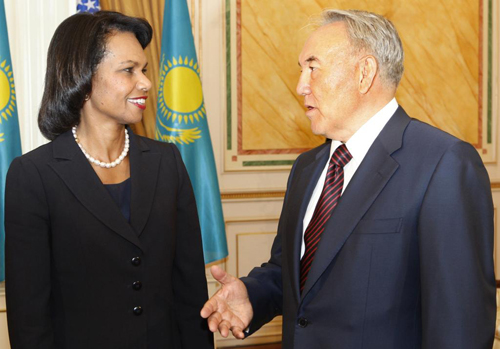
When an authoritarian leader like Fidel Castro or Robert Mugabe pretends to hold an election, we don't bother asking them to make it "a nice clean vote." So why do we go through the motions when it comes to political trials?
This troubling trend was illustrated again last week in Kazakhstan when the human rights leader Yevgeny Zhovtis was brought up on criminal charges relating to a tragic car accident. Leading up to the proceedings, various NGO and government observers issued statements requesting that the Kazakh authorities ensure a "fair trial" for Zhovtis. What happened? The rigged trial barely lasted three days, basic rights to defense were denied, and the country's most prestigious human rights advocate was thrown into a prison colony on a four year sentence.
 President of Kazakhstan Nursultan Nazarbayev and former Secretary of State Condoleezza Rice. (Photo credit: The Official Site of the President of the Republic of Kazakhstan)
President of Kazakhstan Nursultan Nazarbayev and former Secretary of State Condoleezza Rice. (Photo credit: The Official Site of the President of the Republic of Kazakhstan)
For countries featuring deficient rule of law and a record of judicial abuses, to receive a request from reputable voices of the international community to hold fair trials is, inferentially, the most flattering compliment. By implication, we are to assume that such an event is even possible, which presumes legal regularity of the state, lends much needed credibility, and diminishes any pressure for real reform.
Take what we already knew about Kazakhstan before this trial began. The country is still led by its founding president, Nursultan Nazarbayev, former Chairman of the Supreme Soviet, and has not experienced a genuine transition to a free justice system. The 1995 Constitution establishes a boilerplate version of judicial independence but is openly ignored, and no judge can get appointed without first being presented personally by the president then approved by his 88% controlled Senate.
Various international observers such as Freedom House and Transparency International have deplored the judicial corruption in the country, which has instrumentalized the courts both a political weapon as well as a tool of private interests (see the ABA Rule of Law Index report on Kazakhtan for all the lurid stories). Martha Brill-Olcott, a longtime Central Asia analyst, has written that "There is no real rule of law in the country, however, since no one really expects the legal system to afford any protection."
Nor was the Zhovtis trial the first time that Nazarbayev's prosecutors were sicked on one of his opponents. The list of falsely imprisoned journalists (such as Sergei Duvanov, who uncovered Kazakhgate) and opposition politicians surpasses three digits, while many others have met a less ambiguous fate. A few months after the politician Zamanbek Nurkadilov met with the American journalist Paul Starobin of The Atlantic, Nurkadilov was found shot dead - but the authorities made no arrests and suggested it was suicide.
So it is against this backdrop that we are expecting Kazakhstan to observe due process and legal rights of a mild mannered and respected government critic, when only four months ago a UN rapporteur on torture was denouncing "many credible allegations of beatings with hands and fists, plastic bottles filled with sand, police truncheons; of kicking, asphyxiation through plastic bags and gas masks used to obtain confessions from suspects."
It's not only surreality, it's a crime against reality for us to carry on pretending that countries like Kazakhstan can hold fair trials. Even if they were motivated to treat Zhovtis fairly, there is a structural inability to administer justice with any level of credibility under current conditions.
Let's be clear that this is not to discount the important and often thankless work of human rights activists, or the contributions of large NGOs such as Amnesty International and Human Rights Watch, without whom we would face a Hobbesian legal universe. These groups understandably often make calculations to soften their words in order not to loose what little cooperation and gains they have made with a given government. One can appreciate the mere recognition of a trial by an NGO as a game changer, and I wouldn't dare to speculate over the bureaucratic politics behind these decisions.
Nor are political trials the monopoly of any given country or region. Russia is carrying on with the second trial of political prisoner Mikhail Khodorkovsky (whom I represent), China just sentenced the dissident Xie Changfa to 13 years jail, Iran has admitted to killing a detainee (Mohsen Rouhalamini) from beatings, and Burma's angel of democracy, Aung San Suu Kyi, is once again fighting a court.
What we should focus on, at the very least, is coming up with something more effective to say and do when a government lacks a functioning legal system, and appears to be on the verge of rigging up a political trial against an opponent. If a state has not met a hypothetical minimum criteria for rule of law agreed on by the international community, then the conclusion should be similar to the minimum criteria for a democratic vote -- that we stop pretending the government is something that it is not. Incentives must be created for these states to take concrete and measurable steps toward judicial independence and rule of law. For example, legislative provisions could be made to prevent their state-owned interests from acquiring property abroad until improvements are made -- or one of many other ways to ensure that the importance of human rights is finally felt in the presidents' personal pocket books.
There's no reason why the world should have to witness another Zhovtis trial -- neither in Central Asia nor elsewhere -- when there are so many underutilized points of leverage to motivate real change.
